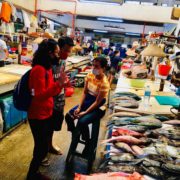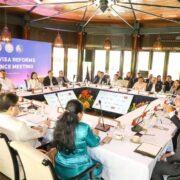
The U.S. government, through the United States Agency for International Development (USAID), has developed an online platform to enable Filipino fisherfolk to sell their produce to consumers amid the ongoing COVID-19 community quarantine.
Created as part of USAID’s Fish Right project, Fish Tiangge is an online marketplace that can connect 6,000 fisherfolks with buyers from more than 300,000 households in three of the Philippines’ most important areas for marine biodiversity: South Negros and Visayan Sea in the Visayas region, and the Calamianes Group of Islands in Palawan.
First launched by Silliman University in Dumaguete City in early April, the publicly-accessible platform enables buyers to purchase fish directly from sellers, and dedicated pedicab drivers deliver orders. Silliman University monitors Fish Tiangge to ensure that no prohibited fish products are sold and that fish are sourced from fishers registered in their localities.
“By connecting fishers and consumers online, the U.S. government is helping to protect fisherfolk income and prevent a food crisis, while ensuring that conservation measures are not compromised in areas that are hard-hit by COVID-19,” said U.S. Ambassador Sung Kim. “We will continue to work with local partners to help Filipinos manage the impacts of the COVID-19 pandemic while protecting the Philippines’ marine environment.”
Fish Tiangge supports ongoing Bureau of Fisheries and Aquatic Resources (BFAR) efforts to connect fishers with markets and consumers in an efficient, cost-effective manner. Thanks to USAID’s partnership with BFAR’s Kadiwa market system, these mobile fish markets are the start of a new, nationwide online supply chain of safe, legally-sourced seafood.
“We want to help our fishers keep their markets open and viable in the face of mobility restrictions under the COVID-19 emergency,” Silliman University president Ben Malayang III said. “Enabling fisherfolk to secure their incomes in times of severe stresses is crucial to both their long-term well-being and their support for compliant, sustainable fisheries.”
USAID’s Fish Right program is a five-year partnership between the U.S. and Philippine governments to address biodiversity threats, improve marine ecosystem governance, and increase fish biomass in South Negros, the Calamianes Island Group, and Visayan Sea. The increase in biomass will benefit more than two million people living in these fishing communities. The Fish Right program is being implemented by the University of Rhode Island, in partnership with local universities and non-government organizations.
—
Stay updated with news and information from the US Embassy in the Philippines by visiting their website at https://ph.usembassy.gov.






